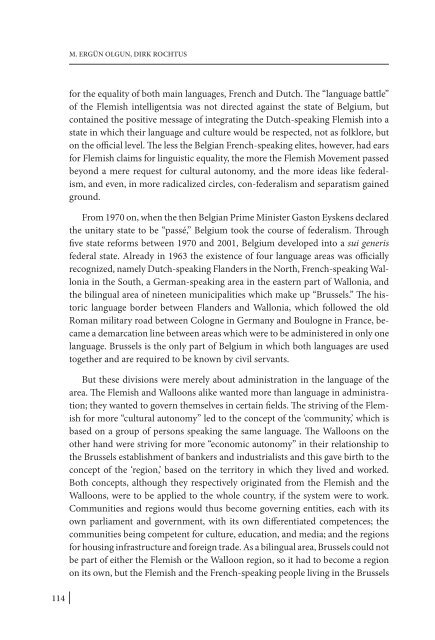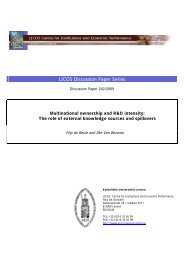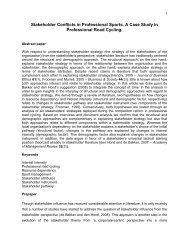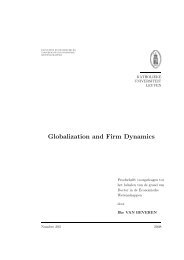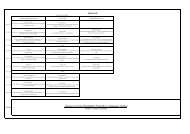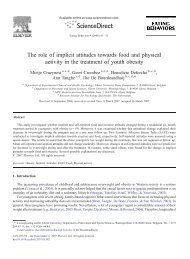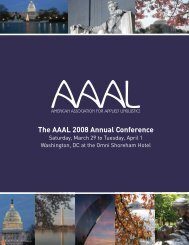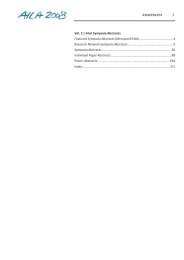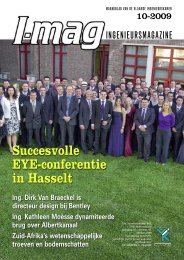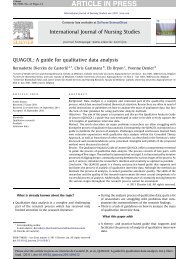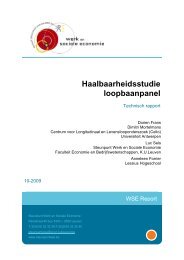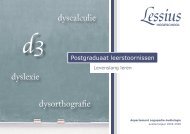View/Open - Lirias@Lessius
View/Open - Lirias@Lessius
View/Open - Lirias@Lessius
Create successful ePaper yourself
Turn your PDF publications into a flip-book with our unique Google optimized e-Paper software.
114<br />
M. ERGÜN OLGUN, DIRK ROCHTUS<br />
for the equality of both main languages, French and Dutch. The “language battle”<br />
of the Flemish intelligentsia was not directed against the state of Belgium, but<br />
contained the positive message of integrating the Dutch-speaking Flemish into a<br />
state in which their language and culture would be respected, not as folklore, but<br />
on the official level. The less the Belgian French-speaking elites, however, had ears<br />
for Flemish claims for linguistic equality, the more the Flemish Movement passed<br />
beyond a mere request for cultural autonomy, and the more ideas like federalism,<br />
and even, in more radicalized circles, con-federalism and separatism gained<br />
ground.<br />
From 1970 on, when the then Belgian Prime Minister Gaston Eyskens declared<br />
the unitary state to be “passé,” Belgium took the course of federalism. Through<br />
five state reforms between 1970 and 2001, Belgium developed into a sui generis<br />
federal state. Already in 1963 the existence of four language areas was officially<br />
recognized, namely Dutch-speaking Flanders in the North, French-speaking Wallonia<br />
in the South, a German-speaking area in the eastern part of Wallonia, and<br />
the bilingual area of nineteen municipalities which make up “Brussels.” The historic<br />
language border between Flanders and Wallonia, which followed the old<br />
Roman military road between Cologne in Germany and Boulogne in France, became<br />
a demarcation line between areas which were to be administered in only one<br />
language. Brussels is the only part of Belgium in which both languages are used<br />
together and are required to be known by civil servants.<br />
But these divisions were merely about administration in the language of the<br />
area. The Flemish and Walloons alike wanted more than language in administration;<br />
they wanted to govern themselves in certain fields. The striving of the Flemish<br />
for more “cultural autonomy” led to the concept of the ‘community,’ which is<br />
based on a group of persons speaking the same language. The Walloons on the<br />
other hand were striving for more “economic autonomy” in their relationship to<br />
the Brussels establishment of bankers and industrialists and this gave birth to the<br />
concept of the ‘region,’ based on the territory in which they lived and worked.<br />
Both concepts, although they respectively originated from the Flemish and the<br />
Walloons, were to be applied to the whole country, if the system were to work.<br />
Communities and regions would thus become governing entities, each with its<br />
own parliament and government, with its own differentiated competences; the<br />
communities being competent for culture, education, and media; and the regions<br />
for housing infrastructure and foreign trade. As a bilingual area, Brussels could not<br />
be part of either the Flemish or the Walloon region, so it had to become a region<br />
on its own, but the Flemish and the French-speaking people living in the Brussels


